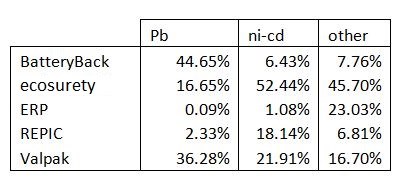ecosurety appears to be bucking the trend when it comes to the UK’s efforts to meet waste portable battery recycling targets.
Although recently released Environment Agency figures on a summary of portable batteries data for 2014 Q1 show that the UK appears to be meeting its statutory EU battery recycling target, the figures also show that this is with a disproportionate volume of lead acid batteries being collected and recycled. However, ecosurety's collection figures show an opposite trend to other Battery Compliance Schemes.
Some industry sources have claimed that the UK was ‘going backwards’ in its progress toward meeting the target (35% in 2014), as the collection rate for lead acid batteries was far higher than the overall proportion of new batteries being placed onto the market; with the volume of nickel cadmium (Ni-Cd) and ‘other’ batteries, which make up a vast majority of new batteries placed on the market seeing a decline.
Lead-acid batteries are collected due to the value of recycled lead, whilst nickel-cadmium batteries have a well-developed collection system in place. This results in an opinion that collection strategies could avoid the collection for recycling of portable ‘other’ batteries, possibly exploiting a loophole.
Collection data for the 2013 Compliance Period, released by the Environment Agency, for all Battery Compliance Schemes show that ecosurety have collected for recycling a higher percentage of portable ‘other’ batteries than any other scheme. See table below.
Table 1. Waste portable batteries collected by each BCS in 2013

ecosurety collected, for recycling, the vast majority (46%) of portable ‘other’ batteries in the UK in 2013, double that of the next closest scheme. 33,625 tonnes of portable ‘other’ batteries were placed on the market in 2013, 91% of the total, and despite not having the majority share of ‘other’ placed on the market (6,228.507 tonnes), ecosurety have far outperformed those schemes whose members do actually make up the main bulk.
This is important as not only does the Batteries Directive aim at avoiding the final disposal and enhancing the collection of waste batteries and accumulators (portable, industrial and automotive), it also specifies recycling efficiency levels focusing on the quality of the recycling process. This relates for the most part to the metals contained in batteries. Mercury, lead and cadmium are by far the most problematic substances in the battery waste stream, highlighted by their classification as hazardous waste. However, other metals commonly used in batteries, such as zinc, copper, manganese, lithium and nickel, may also constitute environmental hazards.
These figures clearly show that ecosurety continue to operate efficiently and promote improvements in environmental performance of batteries, through their life-cycle, and also contribute to a high level of environmental protection.
We could take the easy options to meet regulatory requirements and simply collect majority lead-acid and nickel cadmium for recycling, but it is important that our members, who hold similar environmental ethos’ know that we are fulfilling their obligations within the spirit of the regulations.

Colin Porter
Scheme Operations Lead
Colin joined in October 2011 and is now our Scheme operations lead. He's involved in operational planning and coordination for the scheme compliance regulation across all regulations and his impressive level of experience and expertise ensure that our scheme submissions are accurate and timely.

Useful links
The quarterly data reveals a total of 25,511 tonnes of portable batteries have so far been placed on the UK market this year, 14,738 of which have been collected and sent for treatment to Approved Battery Treatment Operators (ABTOs) or Exporters (ABEs).
Read More >>Provisional figures, published by the Environment Agency on 28 February, highlight the UK’s failure meet its 45% collection target for household batteries in 2017 – a shortfall of 0.12%.
Read More >>Campaign partner Currys PCWorld to collect used household batteries through network of home installation teams to help combat low recycling rates
Read More >>Latest News

Q2 2024 recycling data shows strong performance in H1
By Sam Marshall 24 Jul 2024
Ecosurety continue to step up for refill and reuse
By Victoria Baker 24 Jun 2024
Ecosurety renews B Corp™ certification with flying colours
By Louise Shellard 11 Jun 2024
